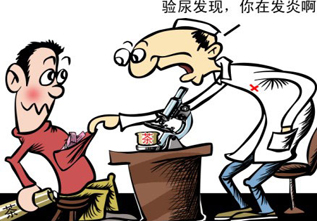| Home / Health / News | Tools: Save | Print | E-mail | Most Read |
| Tea Water as Urine Investigation Sparks Controversy |
| Adjust font size: |
A Chinese reporter who tricked ten hospitals by passing off tea as his urine to see if they would treat him for an ailment has come under considerable criticism in the media and from the Ministry of Health's national spokesman. Mao Qun'an, spokesman of the Ministry of Health, said the reporter disrupted the test procedures in hospitals and has misled the public. "If people keep bringing liquids like beers and sauce as urine specimens for medical tests, hospitals must add a new procedure to test whether the specimen is actually urine which complicates the simple medical procedures," Mao said a regular news conference. The reporter, pretending to be a patient, went to ten hospitals in Hangzhou, capital of east China's booming Zhejiang Province. When he was asked to provide a urine sample he substituted tea. Six of the hospitals claimed they discovered blood cells in the "tea" specimens, while four others reported negative results. Five hospitals prescribed drugs costing more than 200 yuan (US$25) on average.
Doctor is warning a reporter, pretending to be a patient, that blood cells were discovered in his "tea" specimens. The Health Ministry's spokesman says urine tests will detect the same chemical elements in any liquid whether it's urine or tea. "The aim (of the reporter) was to improve the country's medical service, but it has had the opposite effect," said Mao, adding the reporter's methods go against journalistic ethics and bring harm to doctor-patient relations. Both Mao and the journalist, who has not been identified, have supporters and detractors. Cheng Qikun, a chemical expert, said it's impossible for tea to test positive for blood cells, and his view is supported by other specialists on medical testing in Hangzhou. A Beijing doctor, however, supports Mao's suggestion, saying that lab tests can be fooled. Dr. Kang Xixiong of Beijing's Tiantan Hospital says that depending on how the tea is steeped, laboratory or litmus tests could produce false positive results that indicate a kidney ailment. Popular columnist Cao Lin from Sina.com.cn received overwhelming support from readers when he wrote that the Ministry of Health spokesman was missing the point by only criticizing the media. Lin said Mao's comments divert attention from the deep-rooted problems in the medical system. He said the doctors should never have written out a prescription for a costly drug for a simple infection without giving the reporter a thorough physical exam. Other commentators say the reporter used the wrong strategy. They believe a better method would have been submitting urine that had been independently tested to prove it contained nothing to indicate an ailment. (Xinhua News Agency April 12, 2007) |
| Tools: Save | Print | E-mail | Most Read |
 |
| Related Stories |
|
